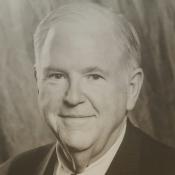John Campbell (Sandy) Burton
 His distinguished career spaned accounting practice, academe, and government. Combining wisdom and wit, he rejuvenated accounting regulation, helped rescue New York City from financial crisis, led one of the nation's best business schools, and even was a statistician for the Brooklyn Dodgers.
His distinguished career spaned accounting practice, academe, and government. Combining wisdom and wit, he rejuvenated accounting regulation, helped rescue New York City from financial crisis, led one of the nation's best business schools, and even was a statistician for the Brooklyn Dodgers.
This consummate New Yorker was born in 1932, the son of an early partner in Arthur Young & Company and the grandson of a minister in the Church of Scotland. Although his parents did not pressure him into an accounting career, he grew up with a keen interest in accounting and its problems of control and measurement. After graduation from Haverford College in 1954 with a major in political science, he entered the MBA program at Columbia University where he majored in accounting and took top honors. Graduating in 1956, he joined Arthur Young & Company in New York, where he became a CPA and a senior accountant with responsibility for the audit of several major listed corporations. In 1960, he returned to Columbia University as a Ford Foundation Fellow, receiving his Ph.D. degree in 1962. During his college days, he worked as an assistant statistician for the Brooklyn Dodgers; when the team moved west, Walter O'Malley offered him a job as Chief Accountant for the Dodgers. Although seriously tempted by the offer, he decided to remain in New York where he was and is firmly attached.
Upon completion of his Ph.D., he joined the faculty of the Graduate School of Business at Columbia University, where he taught course in corporate finance, security analysis, and accounting to MBA and Ph.D. students for over a decade. An award-winning teacher, he had produced 7 books and over 50 articles.
In 1972, he was appointed Chief Accountant of the Securities and Exchange Commission, succeeding Hall of Fame member Andrew Barr. Shortly thereafter, he received a letter from Walter O'Malley, congratulating him on finally taking a chief accountant's job. Beginning his work on June 19, 1972--the day of the Watergate break-in, he is fond of noting--he remained at the Commission for nearly five years, where he quickly earned a reputation for being an activist and an articulate spokesman for the Commission. He was deeply involved in increasing financial disclosure requirements, the development of enforcement activities, the creation of a relationship with the Financial Accounting Standards Board, and the task of communicating SEC principles and philosophy to the accounting profession. During a period of double-digit inflation, he initiated the first requirements for companies to disclose the impact of their current costs on their financial reports, and he prodded the accounting profession in the development of a comprehensive self-regulatory structure that included peer review.
Upon completion of his term as Chief Accountant in 1976, he was appointed Deputy Mayor for Finance for the City of New York in a time of financial crisis for the city. As the senior appointed financial officer of the city, he had the responsibility for long-term financial planning, financial management of operations, and relations with other governmental bodies. He led the city out of its short-term financial crisis by implementing the city's first integrated financial management system and by building tax structures conducive to the economic development of the city.
In 1978, he returned to Columbia University as the Ernst & Young Professor of Accounting and Finance. He became Dean of the Graduate School of Business in 1982 and held that position until 1988. From 1988 to 1991, he was co-editor of Accounting Horizons, a quarterly journal of the American Accounting Association.
His many honors and awards include Hofstra University's Distinguished Scholar Award and the SEC's Distinguished Service Award. He had served on advisory boards and committees for many organizations including the Council of the American Institutes of Certified Public Accountants, the Financial Accounting Standards Advisory Council, the National Association of Securities Dealers as a Public Governor, the Office of the U.S. Comptroller General as a member of the Consultants' Panel, and the American Accounting Association as Vice-President. In addition, he had served on the governance boards of many financial institutions and corporations.
An avid reader and sports fan, he had two children, Bruce and Eve, and lived with his wife, Jane, in New York City. He was the 59th member of the Accounting Hall of Fame. John C. (Sandy) Burton died on May 16, 2010 at age 77.